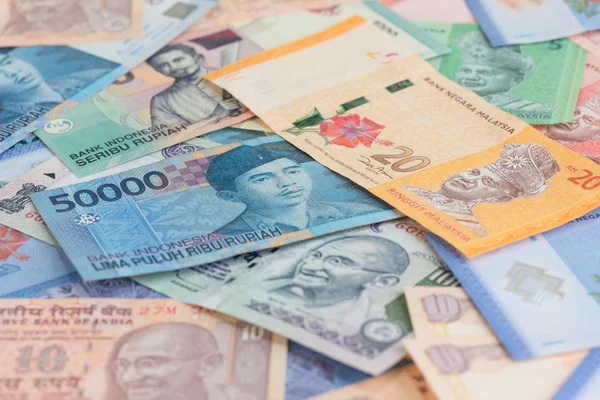In an era where globalization has stitched economies tightly together, the foreign exchange (Forex) market has blossomed into a fertile ground for investors and traders alike. Emerging markets, with their fast-paced growth and untapped potential, offer a myriad of opportunities for Forex trading. However, sailing the seas of developing economies’ currencies comes with its own set of challenges. The fluctuating nature of such markets necessitates a keen understanding of the opportunities presented and the risks involved. This article explores the nuanced landscape of Forex trading within these vibrant economies, providing insights into navigating the currencies, tapping into prospects, mitigating risks, understanding political impacts, recognizing growth engines, and crafting diversified strategies for market engagement.
Navigating Emerging Market Currencies

The journey into emerging market currencies is akin to exploring a new frontier. With less liquidity and more volatility than their developed counterparts, these currencies can offer significant rewards for those who navigate them wisely. The key, however, lies in understanding the unique characteristics of each currency and the factors that drive their fluctuations. Here are crucial aspects to consider:
- Economic Indicators: Keep an eye on GDP growth rates, inflation, trade balances, and commodity dependency.
- Regulatory Environment: Stay informed on central bank policies, currency interventions, and capital controls.
- Market Sentiment: Gauging investor confidence can be a valuable barometer for currency trends.
- Local Market Dynamics: Domestic events, from elections to fiscal policies, can lead to abrupt currency movements.
- Access to Information: Emerging markets might not be as transparent, requiring diligent research and reliable sources.
- Broker Selection: Partner with brokers who have expertise in emerging markets and offer robust trading platforms.
Forex in Developing Economies: Prospects

Developing economies present a fertile landscape for Forex trading, with the potential for high returns due to rapid economic expansion and increased Forex activity. Here are some of the prospects that Forex traders can look forward to in these dynamic markets:
- Potential for High Yield: Emerging market currencies can offer higher interest rates, attracting carry trade strategies.
- Diversification: Adding emerging market currencies to a portfolio can reduce risk through diversification.
- Market Growth: As these economies grow, their financial markets tend to become more sophisticated and liquid.
- Increased Accessibility: Technological advancements have made Forex markets in developing countries more accessible to international traders.
- Currency Appreciation: Some emerging market currencies may strengthen as their economies expand and stabilize.
- Strategic Partnerships: Collaborating with local financial experts can offer insider insights and strategic advantages.
Mitigating Risks in Volatile Markets

While the allure of high returns is enticing, it’s paramount to mitigate risks in the volatile markets of developing countries. A disciplined approach to managing potential pitfalls can protect investments and stabilize gains. Here are strategies to consider:
- Risk Assessment: Before entering a trade, thoroughly assess the risk-reward ratio and set clear exit strategies.
- Stop-Loss Orders: Utilize stop-loss orders to limit potential losses when the market moves against your position.
- Portfolio Diversification: Spread your investments across multiple currencies and asset classes to reduce exposure.
- Continuous Monitoring: Stay alert to global and local events that could trigger market volatility.
- Currency Hedging: Use financial instruments like futures and options to hedge against adverse currency movements.
- Education and Experience: Gain knowledge of the specific emerging market and learn from each trading experience to refine strategies.
Evaluating Political Impacts on Forex

Politics and Forex in emerging markets are deeply intertwined. Political stability or instability can have immediate effects on currency values. Here are key political factors to monitor:
- Election Cycles: Election outcomes can drastically shift economic policies, affecting investor confidence.
- Government Debt: Levels of government debt can influence a country’s credit rating and its currency’s appeal.
- Geopolitical Tensions: Regional conflicts can cause uncertainty, leading to currency depreciation.
- Corruption and Governance: Perceptions of corruption can impact foreign investment flows and currency strength.
- Trade Policies: Changes in trade agreements or tariffs can alter currency demand and supply dynamics.
- Central Bank Independence: The degree of central bank autonomy from political influence is crucial for currency stability.
Emerging Markets: Forex Growth Engines

Emerging markets are increasingly becoming growth engines for the Forex market due to their expanding economic influence. They offer unique advantages:
- Dynamic Economies: These economies often outpace developed ones in growth, driven by innovation and investment.
- Demographics: Younger populations can boost consumer markets and enhance productivity.
- Infrastructure Development: Investments in infrastructure can lead to improved economic efficiency and currency strength.
- Resource Wealth: Many emerging markets are rich in natural resources, which can bolster trade surpluses and support currencies.
- Integration into Global Markets: As emerging markets integrate more into the world economy, their currencies gain prominence.
- Technological Adoption: Rapid adoption of technology can leapfrog development stages, fostering growth and market depth.
Crafting Strategies for Currency Diversification

In the midst of the complexities and prospects of emerging market Forex trading, crafting a strategy for currency diversification is essential. Here are components of a sound diversification strategy:
- Assessment of Currency Correlations: Understanding which currencies move together can help in creating a balanced portfolio.
- Allocation Based on Risk Tolerance: Determine the proportion of high-risk emerging market currencies versus stable developed market currencies based on your risk appetite.
- Regular Portfolio Rebalancing: Adjust currency holdings periodically to align with changing market conditions and risk assessments.
- Long-Term Outlook: Maintain focus on long-term trends rather than short-term fluctuations, which are common in emerging markets.
- Use of Currency ETFs: Consider exchange-traded funds (ETFs) that offer exposure to a basket of emerging market currencies.
- Advisory Services: Seek professional advice to navigate the complex dynamics of currency diversification and emerging market conditions.
Comparison Table: Developed vs. Emerging Market Currencies
| Aspect | Developed Market Currencies | Emerging Market Currencies |
|---|---|---|
| Liquidity | High | Variable to low |
| Volatility | Lower | Higher |
| Interest Rates | Generally lower | Generally higher |
| Economic Growth | Slower | Faster |
| Market Accessibility | Broad | Increasing |
| Political Stability | More stable | More variable |
The Forex landscape within emerging markets is a tapestry of vast opportunities interwoven with complex risks. Traversing this terrain requires an astute understanding of the economic, political, and market factors that sway currency values. As these markets continue to serve as engines of growth for the global Forex market, traders equipped with the right strategies and a keen eye for diversification stand to benefit. The delicate balance of seizing opportunities while mitigating risks can lead to a rewarding journey for those who are well-prepared to engage with the currencies of the developing world.




